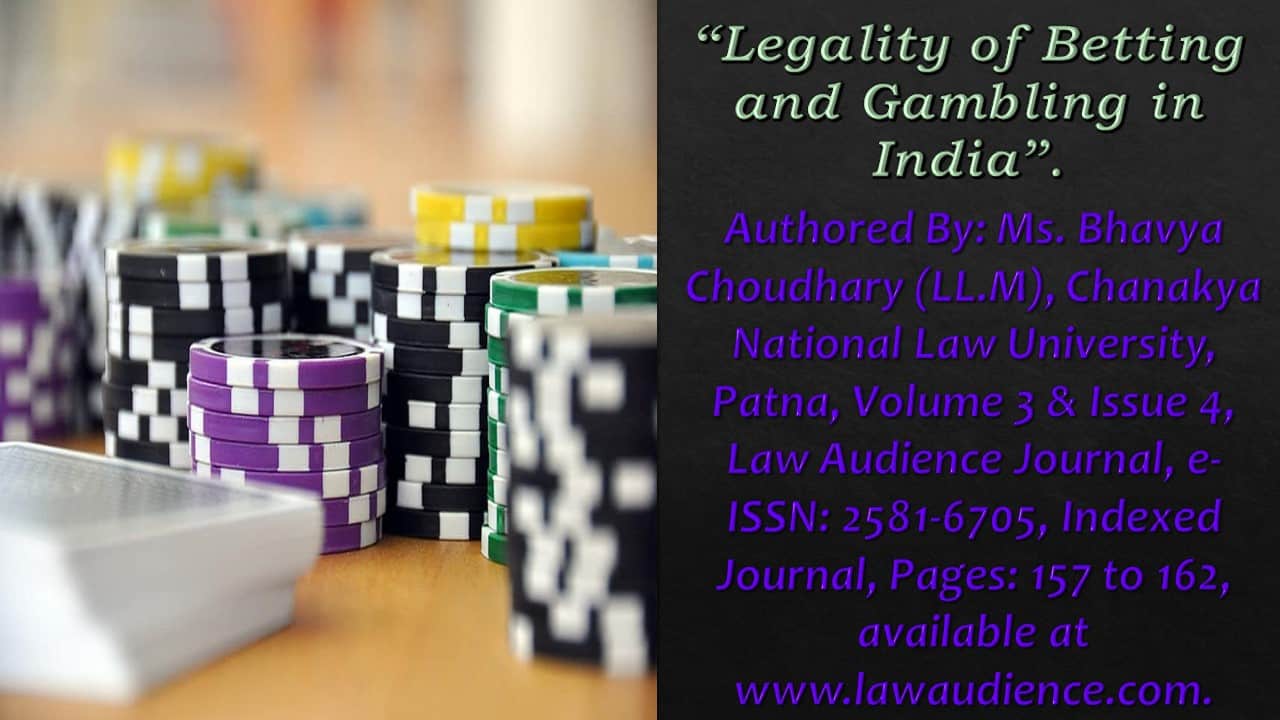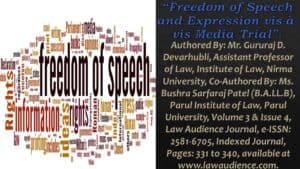Click here to download the full paper (PDF)
Authored By: Ms. Bhavya Choudhary (LL.M), Chanakya National Law University, Patna,
Click here for Copyright Policy.
I. INTRODUCTION:
“Betting and Gambling are engraved in our roots and has been prevailing in India since a long time. Even in the history of Mahabharata[1], a Hindu epic, we have seen the prevalence of gambling. Yudhishtir who was the eldest son of Pandu had a liking for gambling. One of the most fascinating scenes in the Mahabharata shows him losing not only his whole kingdom, but also his brothers and wife in the ‘Game of Dice’.
It is considered one of the favourite pastime activities, however, this has always been looked down upon as it is a method to generate easy money. Betting and gambling are susceptible to a risk of self-inflicted damage. The risk is very high in gambling and betting as a result of which many families have suffered a great loss due to these activities which makes this a problem for law and morality”.[2]
II. LAW RELATING TO GAMBLING IN INDIA:
The first legislation was brought in the year 1867[3], the Public Gaming Act, 1867, which is still being followed in 2022. According to this Act, all forms of gambling and betting activity are illegal, the only exception being horse racing.
However, this act only deals with physical betting. The law is silent on online betting. This 1867 law is still in existence after independence as it was enforced according to Article 372 of the Constitution of India. The Constitution of India gives the power to the State to regulate gambling as it falls under List II Entry 34 of Seventh Schedule[4].
However, if the state fails to regulate, the central act of 1867 will continue to govern. Few states have made certain amendments to the 1867 Act according to the requirement of the State. Gambling is generally prohibited in all states except Sikkim, Goa and Daman.
III. MEANING OF GAMBLING:
The word ‘Gambling’ is not defined under the central Act. In the case of Video Games and Electricals vs. State of Gujarat[5] (2006), it was stated that “the act of wagering or betting” is for money or money’s worth.
Gambling does not include:
- Betting on Horse races;
- Games of Skill;
- Lotteries;
Betting on Horse races and the lottery is subject to legal regulation. In 13 states, playing lottery is considered legal both online and offline. These states are Arunachal Pradesh, Assam, Goa, Madhya Pradesh, Kerala, Maharashtra, Manipur, Meghalaya, Mizoram, Nagaland, Punjab, Sikkim and West Bengal.
Betting on horse race should not be considered gambling. The Supreme Court in K.R. Lakshmanan vs. State of Tamil Nadu & Anr.[6], stated:
“[In a] game of skill […] although the element of chance necessarily cannot be entirely eliminated, is one in which success depends principally upon the superior knowledge, training, attention, experience and adroitness of the player.”
In this case, the court was considered the question that whether horse racing was a game of skill or chance. The Court observed that the outcome of horse race depends on many factors like form, fitness and inherent capacity of the animal, the ability of the jockey, the weight carried and the distance of the race, which are all unbiased facts capable of being evaluated by persons betting. Thus, the Court concluded that the prediction in horse racing is an outcome of knowledge, study and observation. Games of skill should not be included in gambling as because a person possesses certain skill, he is winning a game and putting it within the meaning of gambling would do injustice to those persons. Bringing lottery not under the scope of gambling is incorrect. Lottery, on the face of it, is a mere game of chance. There is no skill involved in it as such. And therefore, it should be kept in the scope of gambling.
IV. GAME OF CHANCE AND GAME OF SKILL:
Game of skill is where the chance of winning or losing does not depend upon the luck but the perfection a person has in that skill. The ‘Game of Chance’ is where no skill is involved and it completely depends upon the luck of the person.
In RMD Chamarbaugwala vs. Union of India[7], it was held that where a certain level of skill is involved, it will not be considered gambling. Therefore, in this case, the Court relied on the skill test.
Relying again on the ‘skill test’, the Supreme Court in State of Andhra Pradesh vs. K. Satyanarayana & Ors.[8], held that, rummy is preponderantly a game of skill and not of chance.
The Gujarat High Court in the case of Dominance Games Pvt. Ltd. vs. State of Gujarat & Ors.[9] held that game of poker is a game of chance and it is prohibited under the Gujarat Gaming Act. In the case of K.R. Lakshmanan vs. State of Tamil Nadu[10], the Court considered horse racing as a game of skill and not gambling.
In the case of State of Andhra Pradesh vs. K. Satyanarayana[11], the Supreme Court allowed the establishment which looks after gaming to collect a small fee for the maintenance of the game of skill.
Supreme Court in the case of M.J. Sivani & Ors vs. State of Karnataka & Ors[12], held that even if skills are involved in a game but it is played with stakes, it falls within the ambit of gambling. This judgment was made in reference to the game of Rummy.
The Kerala High Court in the case of Play Games 24×7 Pvt. Ltd vs. Ramachandran K & Anr[13], held that it does not matter if playing the game of Rummy involves stake or not. It will be prohibited under the Kerala Act.
Games of skills are excluded under the act and by the Judgment of the Courts. According to Section 12 of Public Gaming Act, any game in which skill is the dominant factor, it will not be considered gambling while games of chance would be considered as gambling. The Supreme Court and High Courts in various decisions have given interpretation of game of chance and game of skill.
Therefore, after analyzing the aforementioned decisions, it can be said that where a winner is decided by draw of lots or by game of chance, it should be brought under the scope of gambling. However, where a game is purely based on skill, it should not be considered gambling and must be entitled to get the protection under Article 19(1)(g) under Constitution of India.
V. ONLINE BETTING:
Recently, Google play store removed the Paytm app when Paytm started UPI cash-back for cricket premiere league as it violated play store’s guidelines. Also, a notice was issued to Swiggy and Zomato as they were promoting cashback whoever supported a particular team and if that team won. According to Google, this leads to indirect betting. The Public gaming act of 1867, being an old act, does not mention online betting. However, the Information Technology Act, 2000 and other state’s acts such as the Sikkim online gaming (Regulation) Act, 2008 comes into play and prohibit such kind of betting but there is no special law to govern the same.
VI. BETTING IN SPORTS:
Betting in Sports has always been in controversy. Cricket is a very popular sport in India and is always in the news. It is argued that cricket is a game of skill and therefore betting should be allowed in cricket. This question arose in the case of Board of Control for Cricket in India vs. Cricket Association of Bihar & Ors[14]. The Court constituted a committee under the chairmanship of Justice Lodha. The committee differentiated between match-fixing and spot-fixing and finally gave its recommendation. While the committee agreed that Cricket is a game of skill, it also stated that if betting is allowed it will ultimately lead to match-fixing.[15] In 2018, a law commission[16] was set which recommended the Centre to come up with the law regulating betting in sports and stated that cricket should be exempted from the ambit of gambling and betting.
In December 2020, Niti Aayog[17], the technology think tank body under the ambit of the central government, has published draft guideline proposals. Among other things, the draft proposal seeks to set up uniform operating grounds for online fantasy gaming players across all states in India. It also seeks to establish an independent oversight body, which will control all operational issues of companies in the online fantasy gaming space in India.
While the proposal remains at the draft stage as of now, it finally seeks to validate and establish an industry that can contribute significantly to the growth of homegrown startups. It may also help establish a set of uniform rules for clear regulation in the online fantasy gaming industry, which in turn can help smoothen consumer grievance redressals, as well as enable operators in this field to pursue product innovations and take the field further.
All of this shall come under the ambit of the proposed independent regulatory and oversight body, and the proposal as such can drastically overhaul where India’s online fantasy gaming stands right now.[18]
The Bombay High Court in the case of Gurdeep Singh Sachar vs. Union of India[19], considered that fantasy sports are the game of mere skill and it does not amount to gambling. An appeal was filed in the Supreme Court against this judgment but was dismissed. Betting in sports must be made legal. However, there must be a regulatory body to see that the things are happening in the right way. As already stated by Lodha Committee that legalizing betting in sports would ultimately lead to match fixing. In order to overcome the same, a regulatory body must be set up.
VII. CONCLUSION:
In various Countries like China and the UK, Gambling has been legalized. Legalizing betting and gambling will lead to less corruption and a good generation of revenue for the Government if the income out of it is heavily taxed.
It would also be helpful in curbing the generation of black money as the people who are now earning money from betting and gambling are not accountable and hence, they do not pay tax for the same. We can take the example of UK where gambling and betting are legalized but it is heavily taxed.
The Government should come up with regulating laws and issue guidelines for legalizing gambling and betting in India. The Government of India, being a welfare government[20] should think about the economic and social development of its citizens and legalize betting and gambling.
Cite this article as:
Ms. Bhavya Choudhary, “Legality of Betting and Gambling in India”, Vol.3 & Issue 4, Law Audience Journal (e-ISSN: 2581-6705), Pages 157 to 162 (26th March 2022), available at https://www.lawaudience.com/legality-of-betting-and-gambling-in-india/.
Footnotes & References:
[1] C. RAJAGOPALACHARI, THE MAHABHARATA (57th ed. 2012).
[2] M.B. Majumdar, Commentary on the Bombay Prevention and Gambling Act, 1887 (Sweden Maxwell).
[3] Public Gambling Act, No. 3 of 1867 (1867).
[4] INDIAN CONST., List II Entry 34 of Seventh Schedule.
[5] Video Games and Electricals v. State of Gujarat , Special Civil Application Appeal No. 26114 of 2006
[6] K.R. Lakshmanan v. State of Tamil Nadu & Anr., AIR 1956 SC 1153.
[7] RMD Chamarbaugwala v. Union of India, AIR 1957 SC 628.
[8] State of Andhra Pradesh v. K. Satyanarayana, (1968) 2 SCR 387.
[9] Dominance Games Pvt. Ltd. v. State of Gujarat, C/SCA/6903/2011.
[10] Dr. KR Lakshmanan v. State of Tamil Nadu, (1996) 2 SCC 226
[11] State of Andhra Pradesh v. K. Satyanarayana, (1968) 2 SCR 387.
[12] M.J. Sivani v. State of Karnataka, (1995) 3 SCR 329.
[13] Play Games 24×7 Pvt. Ltd v. Ramachandran K & Anr., WP(C) 35535/2018(N).
[14] Board of Control for Cricket in India v. Cricket Association of Bihar & Ors, (2014) 7 SCC 383.
[15] Report of the Supreme Court Committee on Reforms in Cricket at 61-62 (December, 2015).
[16] Report No. 276 , LAW COMMISSION OF INDIA, LEGAL FRAMEWORK: GAMBLING AND SPORTS BETTING INCLUDING IN CRICKET IN INDIA (July 2018).
[17] Niti Ayog, Guiding Principles for the Uniform National Level, Regulation of online fantasy sports platform in India, Darft for discussion, December 2020.
[18] Ibid.
[19] Gurdeep Singh Sachar v. Union of India, Criminal P.I.L. No. 16 of 2019; Varun Gumber v. U.T., Chandigarh, CWP No. 7559 of 2017.
[20] William A. Robson, INDIA AS A WELFARE STATE (April, 1954).




